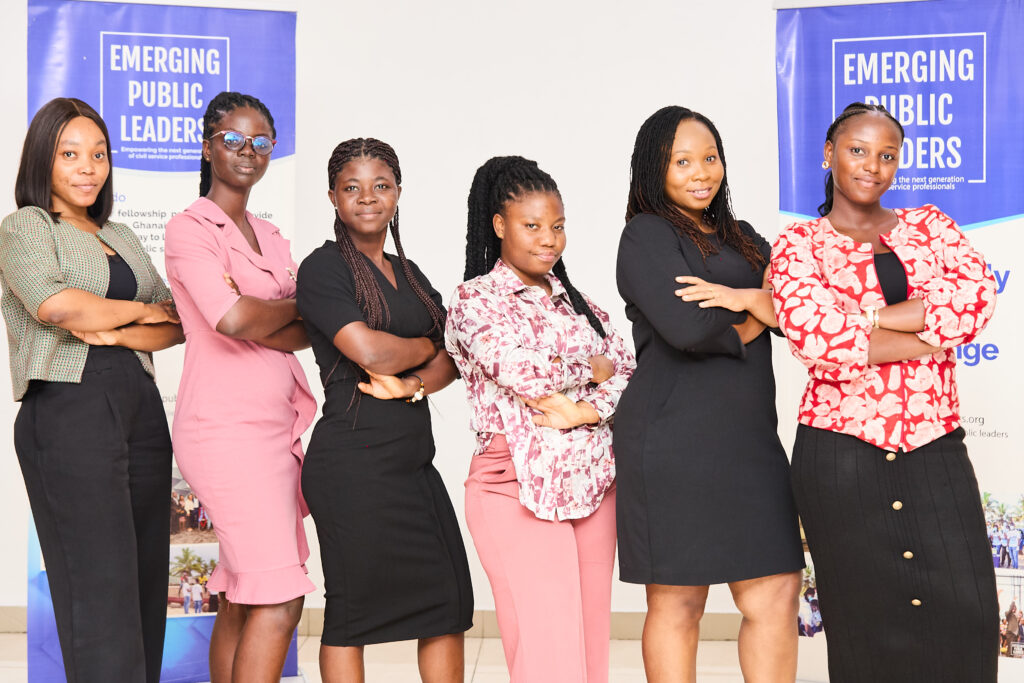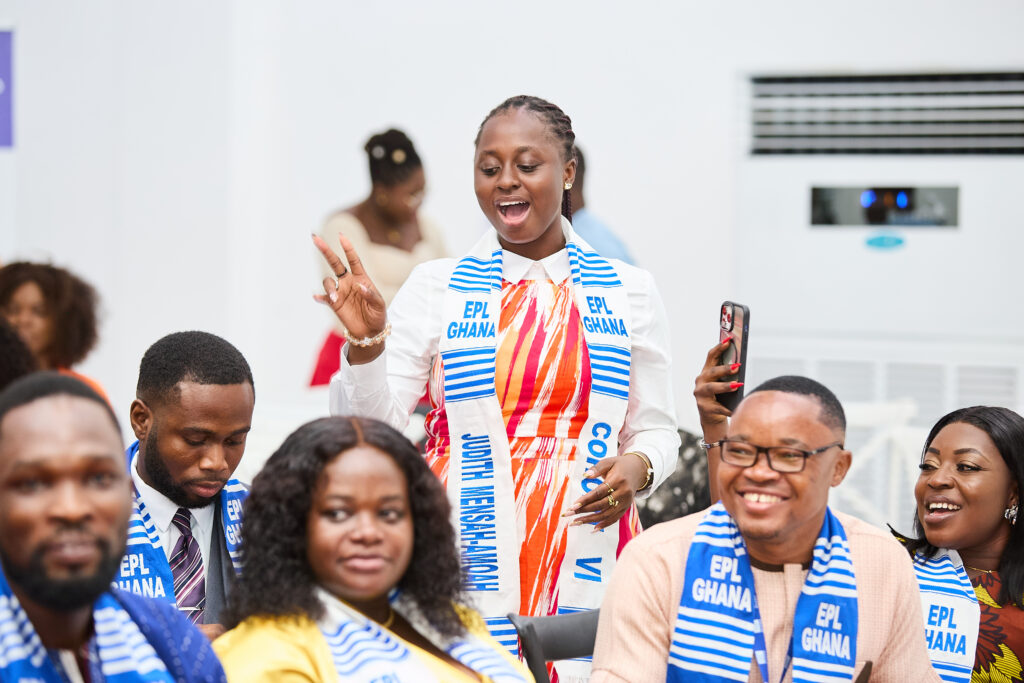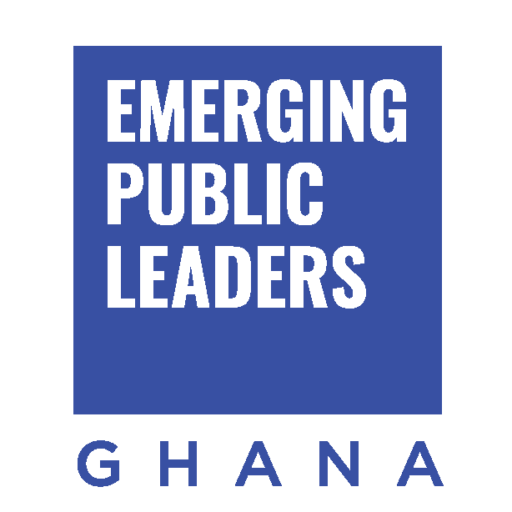Inspiring the Next Generation of Inclusive Leaders: EPL Ghana’s Empowerment and Leadership Tour – June 2025
Inspiring the Next Generation of Inclusive Leaders: EPL Ghana’s Empowerment and Leadership Tour – June 2025 From June 2 to 6, 2025, Emerging Public Leaders of Ghana embarked on an Empowerment and Leadership Tour across the Volta, Eastern, Ashanti, and Central Regions, reaching 7,068 students in various Senior High Schools. The tour promoted Gender Inclusion and Diversity in Leadership among young people.The tour, supported by the Ghana Education Service, created vibrant dialogue, mentorship, and empowerment spaces. Through workshops and forums, students, particularly girls and students with disabilities, were encouraged to explore leadership roles, challenge stereotypes, and champion equity in their schools and communities. Participating schools included Mawuko Girls’ SHS and Akropong School for the Blind. The initiative helped: Deepen understanding of gender equity and leadership values. Build confidence among students to take on leadership roles. Strengthen peer mentoring and advocacy networks.By spotlighting leadership as a matter of competence, not identity, the tour ignited a passion for change among the next generation. EPL Ghana remains committed to nurturing a diverse pipeline of leaders who will advance inclusivity, equity, and transformative leadership in Ghana. Related Articles Other Blogs, Articles, and News Letters Inspiring the Next Generation of Inclusive Leaders: EPL Ghana’s Empowerment and Leadership Tour – June 2025 Read More Equipping Public Servants for Gender-Responsive Governance: GDO Sensitisation Workshop Held in May 2025 Read More Validating Gender Inclusion: Civil Service Finalises Gender Mainstreaming SOP in May 2025 Read More Highlights from the April 2025National Gender Diversity Taskforce Meeting Read More Love0 Share Tweet Share Pin
BREAKING BARRIERS: EMPOWERING WOMEN TO ATTAIN HIGHER LEADERSHIP HEIGHTS

Each time a woman stands up for herself, without knowing it possibly, without claiming it, she stands up for all women
PSF Cohort VI Graduation

Staying to Build: EPL Ghana Celebrates Graduation of Sixth Cohort of Public Service Fellows Emerging Public Leaders (EPL) of Ghana marked a significant milestone on July 2, 2025, as it celebrated the graduation of the 6th Cohort of its flagship Public Service Fellowship. Held under the theme “Staying to Build: Re-Imagining Public Service Leadership,” the event brought together about 150 guests to honour 33 dynamic young leaders who have completed a year of high-impact service within key government and civil society institutions across Ghana. The graduating Fellows served in agencies at the heart of Ghana’s development agenda, including the Ministry of Finance, Ghana Education Service, Ghana Commodity Exchange, Ghana Enterprises Agency, the National Development Planning Commission, and the Millennium Development Authority. Through this immersive Fellowship, Fellows gained hands-on experience and contributed to vital reforms, operational improvements, and innovation in their respective placements. A Call to Stay and Lead Delivering a stirring keynote address, Ms. Juliet A. Amoah, Country Director of EPL Ghana, challenged the graduates and the nation to reimagine public service as a space for innovation, accountability, and purpose. “To re-imagine public service is to break free from the tired script of inefficiency, bureaucracy, and mistrust. It is to see public service, not as a fallback career, but as a platform of purpose. It means we don’t just change policy; we change mindsets. We don’t just digitise services, we humanise governance. We don’t just fill vacancies; we fill them with values.” She said. “Staying is not passive. It is not a resignation. It is a decision. It is an active hope. It is declaring with your feet, your heart, your skill, and your integrity that “this nation is worth it.” She added, calling Fellows to take ownership of the public sector’s transformation. Celebrating Leadership and Excellence The ceremony also featured the debut of EPL Ghana’s Special Awards, a new tradition recognising Fellows whose service and character have been truly outstanding: Public Service Fellowship Excellence Award was awarded to Charity Ama Yekple, who served at the Ministry of Finance and led the graduating class as their Cohort Representative. Her leadership and policy contributions earned wide praise. Innovation in Leadership Award was presented to Abel Buertey Okudzeto of the Ghana Commodity Exchange, whose creative approach to systems improvement led to a full-time job offer from his agency. EPL Values Ambassador Award went to Naomi Tiyumba Joseph, who served at the Ghana Education Service and exemplified EPL’s values of integrity, humility, and impact throughout her Fellowship year. Additionally, Founders’ Awards were presented to Priscilla Elorm Akrong and Mohammed Napare Abdul Hakam, of the newly-admitted Cohort VII Fellows selected to serve as cohort representatives on the EPL Ghana Board and as liaisons for their cohort. Honouring the Journey and Each Other As part of the celebrations, Fellows presented citations of appreciation to members of the EPL Ghana team, recognising the unwavering support that shaped their journey. They also honoured peers whose contributions elevated the group experience, those who showed up not just to do their jobs, but to build community, spark growth, and lead with heart. In her welcome remarks, Mrs Elizabeth-Zionita Akorfa Dzah, Head of Programmes at EPL Ghana, shared a reflective story about a Fellow who once felt under-challenged at her posting but eventually found her leadership voice. She remarked, “Public service isn’t always about fast wins or dramatic change,” Dzah noted. “Sometimes, it’s about showing up consistently. Asking thought provoking questions. Starting small but thinking big.” Partners, Poetry, and Purpose The graduation featured remarks from key partners, EPL Global, facilitators, mentors, and supervisors. A stirring poetry performance by Michael Agbenyegah, a member of the graduating cohort, captured the spirit of public service. A powerful video montage showcased highlights of the cohort’s one-year journey in public service. The ceremony concluded with the symbolic “pinning” of Fellows and a resounding charge from the Advocacy, Communication and Impact manager formally inducting them into the EPL Alumni Network. As they transition into the next phase of their leadership journeys, the Fellows were charged to carry forward a new kind of public service: principled, passionate, and people-centred. END Love0 Share Tweet Share Pin
